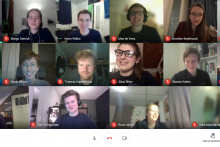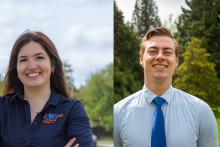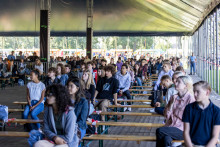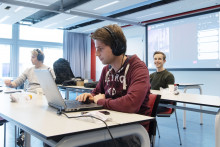Was this discussion different from your usual meetings?
De Vries: 'Yes, this one was a bit more special. Especially because we heard different noises around us earlier. There are students who feel unsafe during exams, for example, while others would very much like to go to university for physical lectures. It's very mixed, which is why we wanted to hold such a specific input session about education in corona time, to find out exactly what the situation is. Not so much to choose sides, but to base our advice on. The session attracted about twenty students, from first-year to master's students.'
What kind of voices were heard?
'Mainly that there are differences in the translation of the generic advice of the Executive Board to the level of faculties and study programmes. We heard that there is a great deal of disparity within the UT. This even extends to the specific exam halls, where students say that in one room the tables are far enough apart and that it is well organised, while about other rooms it is said that the tables are barely one and a half metres apart.
It also became very clear to us that it is about the safety of people and that the situations of students cannot be squeezed through the same mould. Not everyone jumps on his or her bike from his or her campus house to be in the lecture or examination hall five minutes later. There are also students who have to travel a long way by public transport to get home later in the day to their possibly vulnerable parents. Students were positive about the organisation of hybrid education. If teachers offer their education physically and record lectures at the same time, this offers a lot more flexibility.
The discussion was not only about exams and online education, but also about the binding study advice and proctoring. There was not much to say about the BSA, that decision has already been made. But students did express their concerns about proctoring. For example when it comes to safety issues and technology, as a result of recent incidents at other institutions. And what the software is capable of... Does it consider reading a question aloud to be fraud? Fortunately, at the UT we have not received any signals about such hard proctoring.'
What are you going to do with these results?
'We have now gained a better picture of what is going on and we will take that into account in our advice to the Executive Board. It is too late for tomorrow's meeting of the University Council to incorporate the results in a written advice, but we will use them to verbally explain subjects such as online exams. In any case, we will do something with the input of students, we hope that they feel encouraged by it.'






